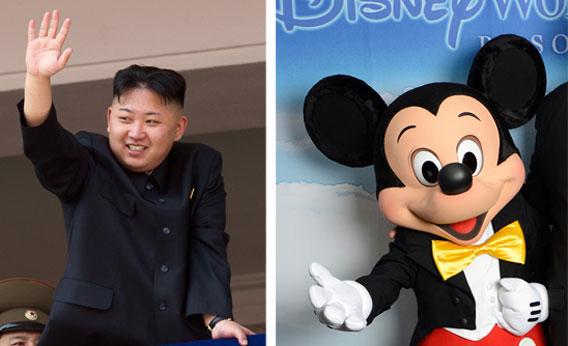North Korean leader Kim Jong-un has broken from family tradition by appearing publicly with his wife, Ri Sol-ju. The happy couple attended an amusement park opening ceremony and a concert featuring actors in unlicensed Disney character costumes. Can the Walt Disney Company stop North Koreans from wearing Mickey Mouse costumes?
No. A 2001 North Korean law prohibits infringement of foreign-owned copyrights, but the law is useless to Disney because there is no international court to hear intellectual property disputes between private parties. Since U.S. courts lack jurisdiction over the Moranbong band—the group whose concert involved the misappropriation Mickey’s likeness—the company would have to sue them inside the hermit kingdom. Disney isn’t going to prosecute such a suit, because the country is notoriously unfriendly to such claims, and trade restrictions prevent the company from hiring or sending attorneys.
The U.S. government is also powerless to help Disney. Although the DPRK is a signatory to the Berne Convention, the leading intellectual property treaty, the country exempted itself from the provision that allows governments to sue one another for breaches of the agreement. If the DPRK were a member of the World Trade Organization, the United States could bring a claim against the North Korean government in that forum. (Ireland once won an intellectual property case against the United States before the WTO, because U.S. law allows restaurants and bars to play music without paying for it.) However, since North Korea’s system of government prevents it from joining the WTO, Uncle Sam could only issue a toothless complaint through the State Department.
North Korea might have a solid legal defense, anyway. In 1928, when Walt Disney introduced Mickey Mouse to the world in the cartoon short Steamboat Willie, producers were required to place a copyright claim in their films. The statement had to include the name of the copyright owner, the year, and the copyright symbol (the letter c inside a circle). Walt Disney included all of those elements in the opening frames of Steamboat Willie, but they didn’t appear next to each other. Legal scholars refer to this as a “dispersed copyright,” and 1920s judges usually ruled them invalid. If a clever litigant had brought a claim at the time, Mickey Mouse would probably have entered the public domain. (The result would have crushed Walt Disney, who had already failed to secure the rights to his first cartoon hit, Oswald the Lucky Rabbit.) Anyone could have pranced around in Mickey costumes or included the plucky mouse in their own movies. Modern judges are reluctant to make sweeping rulings based on such legal technicalities, however, especially when the results would cost one of the world’s largest corporations approximately $3 billion, so it’s probably unwise to challenge the Mickey Mouse copyright.
As for the other characters in the North Korean spectacle, like Winnie the Pooh, Tigger, and one of the seven dwarfs (apparently Bashful), Disney would have an airtight case. The exclusive right to make three-dimensional costumes based on a two-dimensional copyrighted work is one of the derivative benefits that intellectual property provides. The North Koreans’ only potential defense would be the fair use doctrine, which protects trivial or socially useful reproductions of copyrighted material. Quotations inside of book reviews, for example, are permitted under fair use, and the doctrine might protect individuals who wear homemade Mickey Mouse costumes for Halloween. But it’s unlikely that a glitzy show before a head of state would fall within the protections of fair use.
Got a question about today’s news? Ask the Explainer.
Explainer thanks Frederick M. Abbott of the Florida State University College of Law, Peter Jaszi of the American University Washington College of Law, Edward Lee of the Chicago-Kent College of Law, Roger Schechter of the George Washington University Law School, and Peter K. Yu of Drake University Law School.
Video Explainer: Why Don’t Firewalkers Burn Their Feet?
This video was produced from an original Explainer by L.V. Anderson.
Want more questions answered? You can now watch video Explainers at Slate’s News Channel on YouTube.
